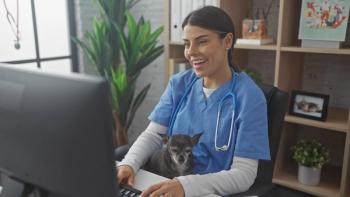
Battling after-hours fatigue? Consider an equine call group
Once upon a time, equine practitioners were willing to do their after-hours work solo. A new generation of fantastic doctors wants to do things a different way.
Late-night calls appeal to some equine practitioners. Others ... not so much. (Shutterstock.com)As it becomes harder and harder to find (and hire) equine-only and mixed animal practitioners, one glaring problem crops up again and again: responsibility for after-hours emergencies. How that specific area of equine practice is handled is having a significant impact on how good your practice's opening looks and how willing doctors are to stick around long-term after taking your job.
For obvious reasons, this is a bigger issue for one-to-two-doctor practices-the fewer doctors on the payroll, the fewer doctors rotating after-hours responsibilities. It stands to reason that Dr. Ivalife is going to burn out more quickly if he or she is on call 50 percent of the time vs. 25 percent of the time. Even so, that distinction may just be putting off what is inevitable: Some doctors don't want to work emergency and late-night shifts at all.
Here are the hurdles equine practice owners and managers need to jump to create an equine or mixed practice that attracts the best 21st-century veterinarians:
“We've always done it this way”
I could spend several paragraphs explaining the problem, but it's easily outlined in one sentence: Employees today don't want to work as many hours as they used to.
That shift isn't limited to certain industries or just to doctors. It's generational. Today's veterinary professionals prioritize time away from work over increased earning opportunities, and that has a direct impact on their enthusiasm about working after hours.
Seasoned practitioners can (and do) recall that they routinely used to work until after 7 p.m. then go see emergencies after that, finally ending up at home too late to spend quality time with their family. They can (and do) recall that when they first started, they had to pay their dues and see most of the emergencies and that an equal rotation was considered a “gift.” They can (and do) recall that their work ethic reminds them that they were hired to do emergency work and as such, they will always consider it their duty.
These things are all true.
And all irrelevant.
Today's practitioners are parents who want to go to their children's after-school activities, eat family dinners and balance work with a meaningful home life. This is something practice owners and managers need to address.
For practices with fewer doctors, splitting on-call duties without help can be crippling. Again, those same seasoned practitioners will note how they always did it, still do it and will continue to do it until retirement. Maybe, but how stable are their home lives? Do the spouse and children share the doctor's commitment to being a one-man (or one-woman) show all night long, every night? There's no question that such dedication is honorable and commendable. It's just not sustainable.
“We can't risk asking help from local competitors”
While companion animal practice can offer a solution to these problems with the availability of a nearby emergency clinic, such options don't usually exist for equine practice. Companion animal practitioners choose not to see emergencies or simply cherry-pick the ones they want and refer the difficult ones. Equine practitioners are stuck with whatever comes their way: colic, dystocia, traumatic injury and more. They're often knee-deep in disaster without the support of their staff or colleagues. It's easy to see how burnout can develop.
One possible solution is the a local equine call group. Reaching out to local or even regional competitors with an offer to share a call rotation can significantly reduce the impact on any one doctor. When this option is brought up to some practitioners, they panic: What if a client likes this other doctor better after the emergency call and jumps ship? I have news for them (that, deep down, the naysayers already know): Many clients are already clients of other practitioners.
Many horse owners have a “backup” option when they can't be seen by their regular doctor-or when they can't be seen exactly when they want to be seen. The fact that horse owners are willing-at times-to see Dr. Al Ternate but still elect to return to Dr. First Choice the next time they need help should provide comfort to those afraid of losing clients because of a single emergency visit.
Paradoxically, spreading the work around can actually bond you more closely to horse owners. A call group shows clients that your doctors have the confidence to let them see other colleagues. Your doctors aren't defensive practitioners who put their financial interest ahead of their clients' needs. Your doctors care enough about always having emergency options available that you're willing to share those duties.
“We can't share information fast enough”
Ten years ago, sharing on-call duties would have been harder because of the difficulty in getting emergency-visit records into regular practice files. No longer. In this day of electronic records, sharing records is a keyboard (or smartphone or tablet) click away. Agreeing on this cooperation in advance allows for a regular expectation of records sharing and will expose anyone who isn't a team player very quickly. Even better, this regular sharing and cooperation on tough cases can help create a bond among practitioners that can only be good for the industry. No doctor is an island anymore, and growing participation in regional practitioner associations is a measurement of that mentality.
“We can't sort out the logistics”
I've explained how this works for equine practices. What about for the mixed practice? Consider a split rotation. Pair a regional call group for horses with an automatic referral for companion animals.
For practices using an answering service, it's easy to screen the clients' needs and send them in the appropriate direction. For practices using a direct call-forwarding system, consider placing a simple answering machine in the loop. Not only does that $30 device provide a buffer between you and the hangups, nonemergency questions and wrong numbers, it lets you leave specific instructions on which numbers to call for specific needs.
In mixed-use practices, doctors who want extra compensation (read: new graduates with huge debt) or doctors who want the fantastic client bonding that comes with after-hours work (when Dr. Ima Vaylable is on call, he or she is the clients' only choice) can elect to participate in both groups by seeing both horses and companion animals on their night. For the rest of your great doctors, consider directing them to the call group of their choice and stop pushing them in a direction they don't want to go.
For every practitioner faithfully doing his or her part after hours, there are two doctors in those jobs looking for a daytime-only gig that's guaranteed to get them home by 5:30 p.m. every night. Failing to recognize and address after-hours burnout might be just the nudge your great doctors need to leave. If you're having trouble recruiting or retaining associates, take a closer look-this issue may be to blame.
Kyle Palmer, CVT, is a Firstline Editorial Advisory Board member and a practice manager at Silver Creek Animal Clinic in Silverton, Ore.
Newsletter
From exam room tips to practice management insights, get trusted veterinary news delivered straight to your inbox—subscribe to dvm360.





